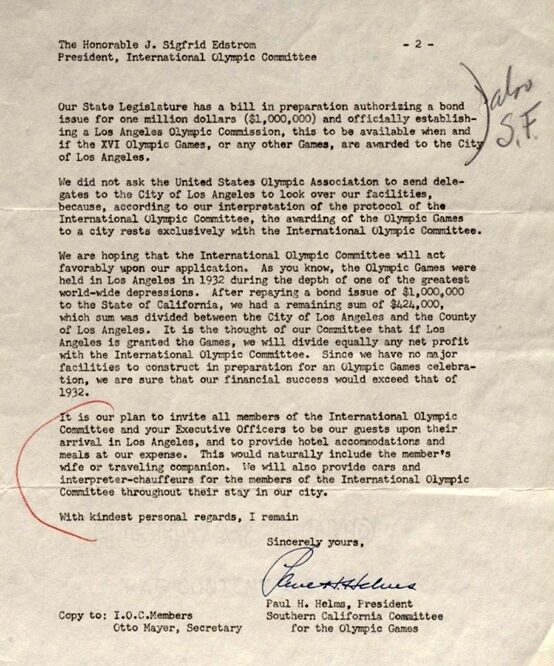'[N]othing we can add… that has not been presented already:' Los Angeles' bid for the 1956 Summer Olympics
Preparations are underway for the 2028 Olympic and Paralympic games in Los Angeles. The city has hosted the Summer Olympics twice before, in 1932 and 1984, but has also unsuccessfully bid for hosting rights on several occasions – including for the 1956, 1968 and 1976 summer games.
AM’s latest publication, The Olympic Movement: Sport, Global Politics and Identity, features a range of sources relating to cities’ bids to host both the Summer and Winter Olympics - both glossy brochures highlighting local infrastructure and correspondence discussing the merits of individual bids.
The bidding process for the 1956 Summer Olympics was hotly contested. Ten cities (including six in the United States) submitted bids to host the games.
Having submitted Los Angeles’ formal bid to the International Olympic Committee (IOC), in a letter dated 25 February 1949, Paul H. Helms, President of the Southern California Committee for the Olympic Games, confidently assured IOC members that there was ‘nothing we can add… that has not been presented already.’ The state of California was even ready to ‘authorise a bond issue for one million dollars’. Helms added that the 1932 games, ‘held during the depth of one of the greatest world-wide depressions’, had not only repaid a similar bond but ended up with a surplus of $424,000 which was presented to local government. Any net profit from the 1956 games would also be shared with the IOC, and with ‘no major facilities to construct’, the committee was sure that the games’ ‘financial success would exceed that of 1932’. Helms even invited the IOC members, their wives, or other travelling companions to Los Angeles on an expenses-paid trip.

© Courtesy of the University of Illinois at Urbana-Champaign Archives.
After four rounds of voting at an IOC session held in Rome in April 1949, Melbourne, Australia was selected as the host city. Los Angeles was eliminated in the third round.
However, preparations in Melbourne progressed slowly. In April 1951, when Australian political leaders considered relinquishing the games, John Jewett Garland, a member of the IOC who had been involved in the Los Angeles bid, let it be known that the city could ‘revive its bid’. And in September 1953, the President of the Long Beach Chamber of Commerce wrote to Avery Brundage, the President of the IOC, congratulating him for his apparent ‘conscientious efforts’ to ‘secure’ the games for Los Angeles. Long Beach, he added, was ready to host the sailing events. Brundage replied firmly:
‘Although many are unhappy about the Games having been located in Melbourne because of the distance and the time and money involved in attendance, I doubt any change will be made. If a last minute shift should become necessary, Southern California is one of the few areas that is prepared to take over on short notice.’
Brundage remained unconvinced by progress in Australia, but the Melbourne games went ahead. Two further bids from Los Angeles for the Summer Olympics would fail (even with the backing of Bing Crosby and then-Governor of California Ronald Reagan) before the city successfully won the right to host the games again.
The Olympic Movement: Sport, Global Politics and Identity is out now. The document featured in this blog (XVI Olympiad, 1956, Los Angeles, CA, 1948-53) is available open access for 30 days.
Recent posts

The blog highlights American Committee on Africa, module II's rich documentation of anti-apartheid activism, focusing on the National Peace Accord, global solidarity, and student-led divestment campaigns. It explores the pivotal role of universities, protests, and public education in pressuring institutions to divest from apartheid, shaping global attitudes toward social justice and reform.

This blog examines how primary sources can be used to trace the impact of young voices on society, particularly during pivotal voting reforms in the UK and the US. Explore materials that reveal insights into youth activism, intergenerational gaps, and societal perceptions, highlighting their interdisciplinary value for studying youth culture, activism, and girlhood across history.
